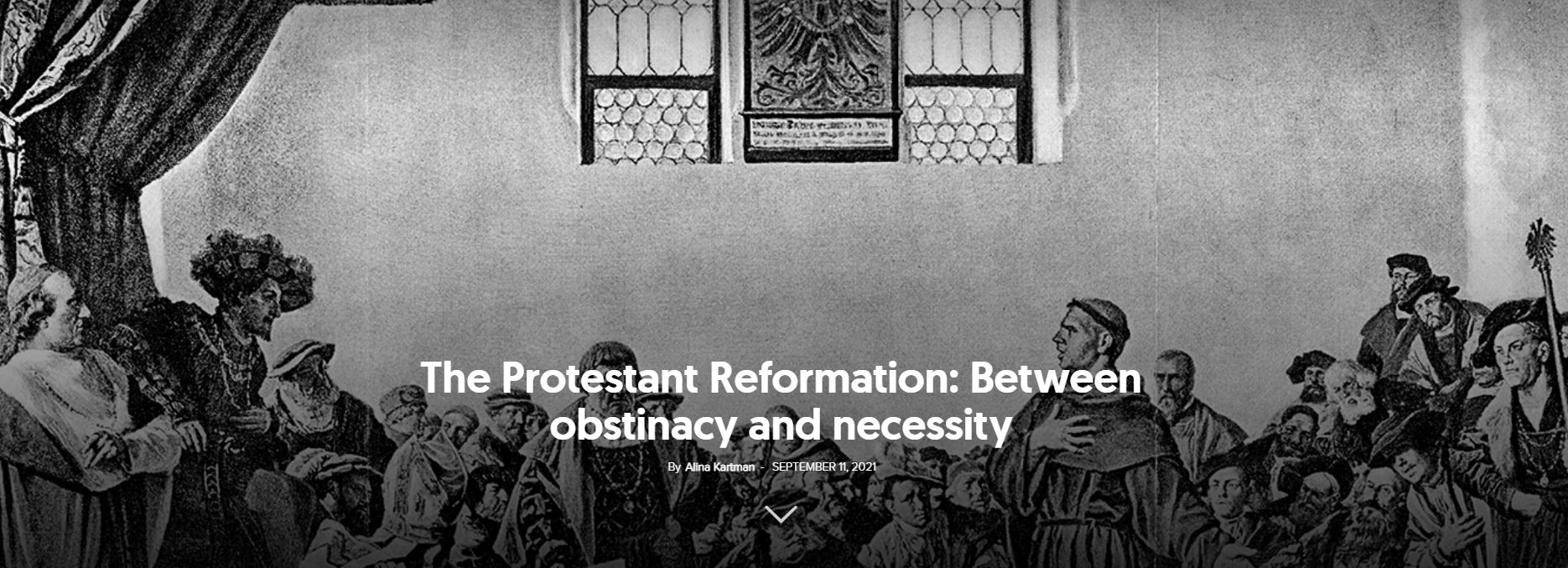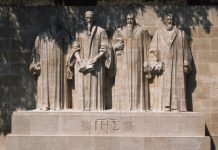After Jesus was born—that is, in the era we call Anno Domini (AD)—the history of mankind was different from that of Christianity. As it is known, the latter was not the history of a triumphant march of Christianity towards its universalization and the unification of the human race. On the contrary, this history can rather be characterised as a manifestation of “the great controversy”, according to the expression christened by Ellen White in the book with the same name, written in 1888. It was a controversy with many heroes and victims, which wreaked havoc on human civilization, culture, and religion.
The Reformation was a crucial moment for this history and I believe that its significance can only be understood if we approach it from two perspectives: (1) as a moment of the great controversy and (2) through the lens of its consequences on civilization, culture, and religion.
Some specialists see the history of modernity as a process of eliminating the transcendent from the explanatory picture of the world. This process started in connection with the physical universe, with Galileo and Newton. It continued with the elimination of the transcendent from the knowledge of society, with Machiavelli, Comte, and Marx, then with the secularisation of the public space by transferring faith to one’s private life and depriving religion of its legitimising function in the public sphere. The process was concluded with the transformation of the cultural universe into a universe of signs, by reducing reality to discourse and freeing researchers from the task of discovering what is beyond words and images.
This is how the worldview of modern man was flattened, inauthentic thinking was amplified on a mass scale and, above all, people started thinking in pictures (image thinking). It is a long intellectual, philosophical, and cultural evolution, made up of numerous episodes, which have as their common denominator the choice of the immanent over the transcendent.
Replacing knowledge of reality with analysis of signs and Truth with meaning along with giving up Truth as a tutelary value in favour of consensus represents the predictable end of a major trend of modern culture. To paraphrase the title of a short story written by Gabriel García Márquez, we can see the intellectual history of modernity as a “chronicle of a death foretold”. It is the “death” of the transcendent in favour of scientific knowledge.
This tendency was announced by Nietzsche, who informed his contemporaries that “God is dead” (Gott ist tot), and consecrated by Heidegger, who stated that “only where there is language, is there world.” By renouncing a transcendent argument, set out beyond the particular contexts and the limited capabilities of the human being, the premise of the relativisation of the Truth was created.
This relativisation reached the point where one of the most important American philosophers, W.V.O. Quine, stated that “from an epistemological point of view”—that is, according to the criterion of the truth value—the concepts of contemporary physics and mathematics are equivalent to the gods of Olympus. Like them, our concepts help us solve the problems we encounter in our relationships with fellow humans and with nature.[1]
As Romanian philosopher Adrian-Paul Iliescu observes, the history of modern thought could be written as “a history of the gradual but systematic elimination of the transcendent from the universe”[2], more precisely—its elimination from the explanatory picture of the universe. By “explanatory picture” I mean the totality of causes that generate phenomena, the conditions that influence their manifestation, and the laws that govern the birth and evolution of phenomena.
In the Modern Era, the causes, conditions, and laws are no longer sought in the world beyond (in transcendence), but in the here and now (in immanence). Nature can be explained by itself (per se)—that is, by its intrinsic causes, conditions, and laws, without the need to appeal to a law outside of it. The idea of God no longer has explanatory power. It can provide meaning to the world and a finality to our lives, but it cannot reveal the causes, conditions, and laws that explain natural and social phenomena. It can no longer answer the “Why?” question.
The Renaissance produced a definitive inversion of the hierarchy between transcendent reality and accessible reality, in favour of the latter. Galileo-Newtonian physics amounted to the explicit elimination of the transcendent from the sphere of scientific concerns.
Motion was no longer a mere external (secondary) effect of some mysterious (primordial) “forces”. The free fall of bodies no longer meant their “transition” to an ideal position (to “the natural place”). Visible space-time (therefore earthly) displacement becomes Reality in the fullest sense of the word. The former “natural philosophy”, founded by Aristotle in Metaphysics, becomes Physics. The goal of knowledge is no longer the identification of mysterious “hidden causes”, as was the case for Aristotle, but the mathematized description of visible events (for instance, motion).[3]
Over the course of two centuries, this new type of explanation became the ideal of cognitive rationality. The absence of the transcendent is no longer considered a deficiency or a sign of spiritual degradation, but a merit. Later, when Napoleon Bonaparte asked Laplace why there was no reference to God in Celestial Mechanics, he replied: “Sir, I have no need of that hypothesis.” (Sire, je n’avais pas besoin de cette hypothèse!). Laplace’s words are the linguistic expression of the new paradigm, which would soon become the dominant paradigm in the knowledge of nature.
A “disenchanted” society and an increasingly precise yet increasingly narrow knowledge
As for the knowledge of society, this was more difficult to establish. This only occurred with the positivism of Auguste Comte and the historical realism of Karl Marx. For them, history was no longer a manifestation of the Idea—neither of the divine project (as in Christianity) or of the Absolute Spirit (according to Hegel).
On the contrary, ideas are considered historical manifestations, becoming themselves an object of knowledge. The spirit is no longer a transcendent reality of social life, but one of its parameters: a simple consciousness of existence (Marx). In the purest positivist spirit, which was hostile to “scholastic discussions” about things that cannot be quantified and measured, Engels would say that, with the conception of his friend Marx, philosophy was banished not only from nature, but also from history (“philosophy” in the sense of speculative philosophy): “The problem no longer resides in inventing connections, but in discovering them in facts.”[4]
In their view (which is tributary to the intellectual fashion of the moment, positivism), nothing is worth discussing if it cannot be the object of a scientific experiment or a material practice—that is, if it cannot be mastered by human reason and by our senses.
Following this process, the path to truth was narrowed down more than ever in the history of mankind: the more objective, measurable, and controllable one wanted knowledge to be, the fewer areas of reality were included in the “cognitive possibility”—that is, in the area where one can speak of authentic knowledge. The Modern Era has proposed a very narrow path as the road to truth, flanked on one side by the “boulders” of speculative thought, which was criticised for its lack of foundation in human experience, and, on the other side by the “chasm” of mysticism, rejected because it originated in a tradition of superstitions and irrational beliefs.
Adherents of the positivist conception remained prisoners of a vision of “science” and “scientificity” that led them to eliminate many forms of knowledge from the citadel of Objective Knowledge. For instance, artistic or religious knowledge, labelled as “mystical,” cannot be included in the “canonical form of knowledge,” although in all the great religions of the world (Judaism, Buddhism, Confucianism, and Christianity), which propose self-knowledge as an ideal, this has a fundamental role, substituting the so-called “objective” knowledge defined in terms of (Western)-European culture.
In this paradigm, the subjective element cannot be an object of knowledge. It is not included in the space of the “cognitive possible,” because the knowing subject is suspected of considering their own wishes a reality, their dreams a possibility, and, in general, of projecting themselves into the reality they claim to know. In this subjectivity-free space there are no limits to clarity and objectivity: “Everything that can be thought at all can be thought clearly,”[5] Wittgenstein says. In conclusion, a complete objective picture of the world can be obtained, and the goal of science is precisely to obtain this picture.
The ideal of complete objectivity was inherited by modern science from Christianity, where the Saviour affirms: “I am the way and the truth and the life”—therefore where the truth is total and eternal. However, the truth desired by scholars was no longer a revealed truth, as in Christianity, but one constructed, elaborated, and obtained with toil and sacrifice by some people endowed with exceptional qualities. In fact, the modern scientist posed, more or less consciously, as a deity capable of reaching full knowledge. The modern scientist wanted to take God’s place.
Saving the ideal of full knowledge in its Christian version
Unfortunately, the new cultural paradigm, which affected European civilization in the last centuries, had from the beginning some limitations that are difficult to notice in the context of the general enthusiasm regarding the return to the human (one of the great Renaissance ideals), to nature (another ideal of the Renaissance), and to immanence (an ideal of knowledge which soon became an ideal of rationality and a standard of the realistic attitude towards reality).
The only vigorous reaction to this degradation of the idea of transcendence was the Reformation. Neither the Western nor the Eastern Church could have countered the advance of atheism, i.e. of rationalism, positivism, and scientism, glorified in the name of emancipation from religion, because by “religion” modern scholars and Enlightenment philosophers understood exactly the Roman Catholic and Christian-Orthodox religions. When they made accusations of speculative thinking, scholastic discussions, or lack of relevance for practical life, they were referring to these two religions.
Just as their references to the arbitrariness of tradition or the corruption of the clergy targeted the Roman Catholic Church, the moral promiscuity and mysticism that Denis Diderot describes in The Nun (1796) referred to the atmosphere in the Catholic monasteries of France.[6] The Jacobins’ guillotine was an answer to the Inquisition’s burning stake, and the word of the Vatican was no longer relevant.
The apostles of the Reformation had the great merit of having taken on a task that Catholicism could no longer carry out: the opposition towards a worldview and an attitude towards its knowledge that had some limitations which were still invisible at the empirical level, but which, from a biblical perspective, were the expression of the greatest sin: pride. Luther, Huss, Wycliffe, Zwingli, Calvin, the Wesley brothers, and others were constantly aware of the dangers of this sin, and the illusions of modern scholars did not even cross their minds.
What were these illusions? Firstly, the scientific discourse of modernity is considered all the more objective the more it eliminates the knowing subject—but this is, at the same time, the subject of the action. Secondly, positivism legitimates the illusion of unlimited human reason and the possibility of the complete objectivity of human knowledge. Thirdly, truth is conceived as a correspondence between a reality (primary) and a discourse (persistently secondary), which excludes the possibility of the discourse participating in the birth of reality or in its change.
Saving the unity between knowledge and action in European culture
The positivist paradigm of knowledge was the basis for a generalised madness, which accounts for the current crisis of the European-type civilization. In short, it can be characterised as a congenital inability of modern discourse to master, through the logos, the reality it claims to reflect.
I believe that the anti-humanist deviations of some humanist ideologies (through their initial endeavour) must be linked to the gap between discourse and conduct, typical of modern culture, to the inability of a subject’s discourse to regulate and shape the same subject’s conduct. The best products of the discourse were other discourses, not real people. For the current period, we can meditate on the havoc wreaked by “peace missions” in different parts of the world or the so-called “revolutions” that destroyed the unity of some nations and the balance of power in large areas of the world. For five centuries, Power and Truth have been in opposing positions, and deceit is predominant.
When it comes to the gap between the subject of knowledge and the subject of action, the issue of the implications of the development of science and technology on the human condition occupies a prominent place in contemporary European philosophy (it is present in almost all the important currents that have dealt with the crisis of European civilization and/or culture).
Fortunately, the Reformation manifested itself also as a necessary moment in the evolution of human knowledge (more precisely, in the evolution of the relationship between science and religion; the relationship between Reason and Faith) and only later as a moment in the evolution of power relations between the church and society, so that, in the end, it would become, through its consequences, a moment of crossroads in the evolution of the Christian religion.
How did the Judeo-Christian civilization save itself from this decay? Through the Reformation and its consequences on civilization, culture, and religion—among them, the birth of the Protestant religion and later of the neo-Protestant cults, which reintroduced into the Christian religion some principles without which Christianity would not have been able to withstand the wave of atheistic rationalism, demystifying criticism, and human emancipation.
We are talking, first of all, about the principle of free will and freedom of thought and expression, but also about Sola Scriptura, in which I see an exceptional methodological principle, which ensured the continuation of the process of knowledge and critical thinking outside of the modern paradigm that gave up transcendence in favour of immanence, resulting in the unprecedented narrowing down of the field of human knowledge. Martin Luther and his followers saved the idea of God as an explanatory principle and, at the same time, the idea of the dignity of human thought as a manifestation of reason and freedom—consequently, the unity between faith and will, between thought and action.
When he says, in front of the Diet of Worms: “Here I stand; I cannot do otherwise, so help me God!”, Luther reaffirms some constitutive principles of Christianity: the revealed character of the Truth, revealed through the Bible, as well as the obligation of a believer to respect the revealed Word with sanctity. He also gave a lesson in intellectual honesty and moral integrity that marked the dawn of modernity.
I insist: the Reformation did not introduce these principles into Christianity, but re-introduced them. I think Ernest Renan was right when he said that, in a certain sense, Protestantism meant a return to the original Christianity. The aggressive intolerance manifested over a long period of time in the history of the Catholic Church was perceived as a betrayal of genuine Christianity, as an abandonment of the revolutionary spirit that animated it when it appeared, just as Islam can be seen as “a sort of resurrection of Judaism.”[7]
Many reformations have been said to have been “revolutions”, and most of them have been recorded in history as such. The irony is that one of the most radical revolutions in human history remains known as a reformation.
This is yet another proof of the modesty of those exceptional people who preferred not to please the leaders of their times, but to please God, and allowed themselves to be ostracized, marginalized, persecuted, tortured, and even killed just because they believed in God, respected His Word with holiness, helped their fellows, refused to kill and falsely testify, lived frugally and made a living from their work and God’s will.
These people gave birth to the “Protestant morality,” which a genius like Max Weber saw as a cornerstone of capitalism, analytical philosophy, critical thinking, pragmatism, and of the British, North European, and North American civilizations. These people, who changed human civilization from the ground up, called themselves… “reformed.”
Dumitru Borţun is a philosophy PhD and professor at the National School of Political and Administrative Studies in Bucharest (SNSPA). He is a specialist and a trainer in communication, and a founding member of the Romanian Public Relations Association.




















